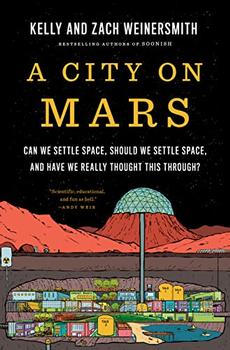Summary | Excerpt | Reading Guide | Reviews | Beyond the book | Read-Alikes | Genres & Themes | Author Bio

Andy Weir's first novel, The Martian, can be briefly described as "Robinson Crusoe on Mars." Weir's hero, astronaut Mark Watney, is abandoned on the planet when his teammates leave him behind, believing he has died in the catastrophe that has forced their evacuation. Injured and reliant on marginally functional equipment and meager food supplies, Watney refuses to give up and uses his skill and ingenuity to work out a way to survive.
Much of the narrative consists of entries from a log Watney keeps, written to document his endeavors for future explorers. Riddled with profanity and a dry sense of humor, the short, snappy paragraphs allow readers to really get a feel for this funny, irreverent and marvelously inventive protagonist. He's the smart-alecky, slightly bad-boy kind of hero one can't help but root for – a cross between TV's resourceful MacGyver and Chris Pine's Captain Kirk in the Star Trek movies. When trying to find something to burn in the fireproof environment in which he finds himself, for example, Watney is forced to make do:
After a search of everyone's personal items (hey, if they wanted privacy, they shouldn't have abandoned me on Mars with their stuff) I found my answer.
Martinez is a devout Catholic. I knew that. What I didn't know was he brought along a small wooden cross. I'm sure NASA gave him shit about it, but I also know Martinez is one stubborn son of a bitch.
I chipped his sacred religious item into long splinters using a pair of pliers and a screwdriver. I figure if there's a God, He won't mind, considering the situation I'm in.
If ruining the only religious icon I have leaves me vulnerable to Martian vampires, I'll have to risk it.
Consisting largely of dialog, other parts of the story are third-person accounts of action taking place at the Johnson Space Center in Houston, Texas, and aboard the Hermes, the space ship on which Watney's crew is returning to Earth. The narrative techniques cause the pages to fly by; I found the novel an exceptionally quick read.
The Martian is an absolute blast and will doubtless appeal to fans of science fiction. The science and technology on which the plot relies are not only crucial to the story but are plausible (you won't find little green men in this narrative, just the normal two-legged kind). This shouldn't discourage fans of softer sci-fi or even general adventure fiction as this book is relatively accessible; there's certainly plenty of technical information, but not so much that it'll make a casual reader's eyes cross. Besides, grasping all the details isn't necessary to one's enjoyment of the novel.
I would be remiss, though, if I didn't point out that The Martian is far from flawless. The downside of the epistolary format in the context of an adventure story is that much of the action happens "off-camera," so to speak; the reader is told about an event well after its occurrence, lessening the tension that might have been created with a third-person blow-by-blow account. The narration is also too consistent; Watney's log is unrelentingly upbeat, even in failure. One would expect more depth and variety in a castaway's emotions, but there's no indication of sorrow, depression, sense of loss, or the type of contemplation you'd expect from someone journaling about their almost certain death. I also felt that everything was too easy; there was never the sense that the hero's survival was on the line, only that each problem would have a resolution. And finally, the author takes great pains in demonstrating that the solutions to the problems encountered by his protagonist can actually be used. But many readers will find the facts and figures too detailed; the level of information gets a little tedious when one is eager for the plot to proceed.
Although these concerns make it sound like the book has some pretty significant problems, The Martian really is a great deal of fun. (I personally thought it was such a hoot that I ended up buying three copies to give to friends – something I seldom do.) Readers looking for a fast, entertaining novel that will nourish their inner space geek will definitely want to pick up a copy.
![]() This review was originally published in The BookBrowse Review in March 2014, and has been updated for the
November 2014 edition.
Click here to go to this issue.
This review was originally published in The BookBrowse Review in March 2014, and has been updated for the
November 2014 edition.
Click here to go to this issue.

If you liked The Martian, try these:

by Kelly Weinersmith, Zach Weinersmith
Published 2023
From the bestselling authors of Soonish, a brilliant and hilarious off-world investigation into space settlement

by Andy Weir
Published 2022
A lone astronaut must save the earth from disaster in this incredible new science-based thriller from the #1 New York Times bestselling author of The Martian.
The low brow and the high brow
Click Here to find out who said this, as well as discovering other famous literary quotes!
Your guide toexceptional books
BookBrowse seeks out and recommends the best in contemporary fiction and nonfiction—books that not only engage and entertain but also deepen our understanding of ourselves and the world around us.